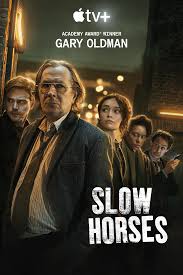Understanding Slow Horses: Literature to Screen

Introduction
‘Slow Horses’ has emerged as a significant cultural reference in the realm of contemporary literature and television drama. Adapted from Mick Herron’s espionage series, this gripping narrative explores themes of failure, redemption, and the often gritty reality of intelligence work. With the rise of the Apple TV+ series, the relevance of ‘Slow Horses’ has intensified, inviting discussions about its impact on modern storytelling and the portrayal of espionage.
The Premise of Slow Horses
‘Slow Horses’ centres around a group of MI5 agents who have made errors in their careers, leading them to be assigned to Slough House, a place considered a purgatory for failed spies. The team, led by the sarcastic Jackson Lamb, navigates a series of misadventures while attempting to redeem themselves. The character development and dark humour present in Herron’s writing encapsulate not just the personal struggles of these agents, but also a broader commentary on intelligence and bureaucracy.
From Page to Screen
In 2022, the Apple TV+ series adaptation of ‘Slow Horses’ brought the book’s thrilling tension and intricate characters to a wider audience. Starring Gary Oldman as Jackson Lamb, the series received critical acclaim for its engaging performances and clever writing. Critics praised the adaptation for remaining true to the source material, capturing both the suspense and the comedic aspects that make the narrative unique. The successful reception of the show has led to discussions about potential future seasons, further expanding the narrative universe.
The Message Behind Slow Horses
At its core, ‘Slow Horses’ offers a profound examination of human resilience and the ability to rise above one’s failures. The series and books highlight that while espionage is often romanticised in popular culture, the reality is laden with complexity and often mundane difficulties. The characters’ journeys towards self-discovery not only entertain but also provoke thought regarding personal accountability and societal expectations within intelligence operations.
Conclusion
The cultural significance of ‘Slow Horses’ continues to grow both in literature and on-screen adaptations. As audiences engage with both formats, the series prompts reflections on the themes of redemption and the precarious balance between success and failure within the intelligence community. With forecasts of renewed interest in psychological thrillers and character-driven narratives, ‘Slow Horses’ stands as a timely reminder of the narratives that resonate with our own experiences of struggle and redemption.
